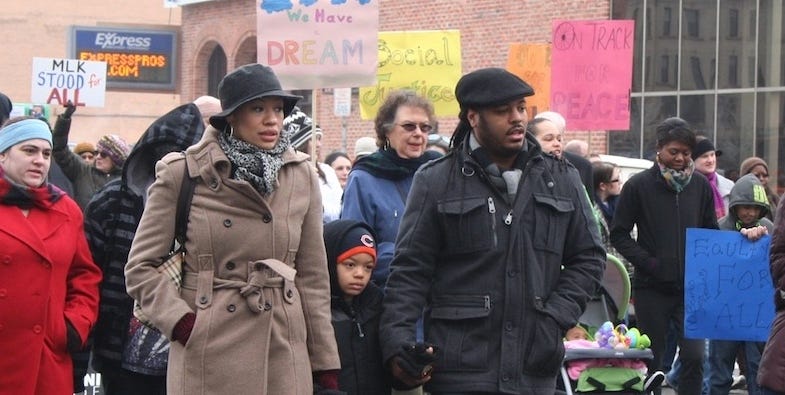Dawn at Soda Lake, in the Drumheller Channels north of Othello, WA
New notes for the refrigerator door
If historian Heather Cox Richardson is correct that the American century came to an end early last Wednesday morning, the new America—and there should be one—will have to be much smarter, more conscientious and more principled than the one that came out to vote 12 days ago.
Fourteen years ago this month I wrote an essay, the subhead for which is: Democracy rests on the Jeffersonian premise that voters are willing to sort fact from fiction. Would that this were happening.
The main head was a bit more tart: “Stuck in Stupid” It rested upon emerging social science that showed that when American adults were confronted with evidence that “facts” supporting their beliefs were illusory, a disturbingly large fraction responded by simply doubling down on their beliefs. This was great news for charlatans—like Trump’s parrot and future media advisor Steve (“flood the zone with shit”) Bannon, but ominous news for journalists and scientists. More importantly, it was (and remains) ominous news for whole communities of people who endeavor to lead virtuous lives and inspire virtue in others. Virtue is rooted in honesty and honesty is what decency requires.
What I didn’t know then is that the habitual disregard for the truth of the matter(s) would lead to a pseudo-news operation (Fox News) choosing to feed defamatory disinformation to its audience because its audience demanded it. What I didn’t know then is it would also lead to the January 6, 2021 insurrection at the Capitol, incited by Donald Trump’s “Big Lie” that the 2020 presidential election was stolen from him.
Trump’s brand is fraud and the apparent success of his corruptions has been ratified with a vote to return him to the White House. It’s not a book we’d have ever imagined for the American history shelf. But there it is: a habitual liar, adjudicated sexual predator and convicted felon, re-emerging from disgrace to occupy the most powerful office in the world.
(Screenshot from “Crooks & Liars” website, Sunday 11/17/24)
The anger and distress this evokes is real and, in my American family and millions of others it burns with betrayal. And it’s not over. On Wednesday Trump announced he would appoint the least popular member of Congress—Florida’s representative Matt Gaetz—to be the U.S. Attorney General. Among other things, this allowed Gaetz to resign from Congress, just hours before the Congressional Ethics Committee was expected to release its report on allegations that Gaetz was involved in a sex-trafficking ring involving under-age young women, illicit drug use, and obstruction of justice. What doubtless makes Gaetz a favorite of Trump’s is Gaetz’s pledge to purge the Justice Department of officials who may resist Trump’s campaign promise to seek “retribution” against his political opponents.
I could add to the list of Trump’s actions to re-make the federal government in his own image, but that’s a much longer docket than I have room for today. (e.g. Robert F. Kennedy, Jr., for the head of Health and Human Services.) More to the point, if there’s a way back from this nightmarish effort to repurpose the federal government as part of Trump Inc. (Or Trump/Musk Inc.)—it is through a committed challenge to its civil and moral bankruptcy. Our aspiration for “liberty and justice for all” (to quote the Pledge of Allegiance) is one that runs well ahead of our imperfect politics and governance. But it’s vital that we hold ourselves to it and not retreat in despair from public life. America can’t be “great” in any respect unless it evinces a commitment to freedom, equal protection and the rule of law. Trumpism is antithetical to these values.
Martin Luther King Jr. Day marchers in Spokane, January 2014
A former subscriber accused me recently of being a shill for liberals and Democrats. I dispute this. I did vote for Harris (for reasons I’ve explained) but, by my lights, her worst moment came in an early October when she was asked if she would have done anything differently than Biden if she were President. “There’s not a thing that comes to mind in terms of – and I’ve been a part of most of the decisions that have had impact, the work that we have done,” she said.
I winced when I read her comment. The first thing that comes to my mind is the Biden Administration’s actions (and inaction) on Israel and Gaza. They’re not just deplorable (leading to the resignation of several talented and conscientious public servants) but they involve violations of U.S. and International law intended to protect non-combatants. If we’re going to stand for human rights and the rule of law (and we must) we can’t do it with asterisks, bemoaning the killing and maiming of civilians with U.S. supplied ordinance, but then continuing to supply the ordinance for the atrocities. Biden got away with it because his party (largely) rallied behind him and likely benefitted from the perception that Trump would support an even bloodier policy on behalf of his close political ally, Israel’s controversial Prime Minister Benjamin Netanyahu. As I noted, last February, Biden and Harris also got a pass from influential voices in the mainstream press.
I raise this for two reasons. One is we only make it easier for Trump’s supporters when they are able to cite examples where his political adversaries have been hypocritical when it comes to values and enforcement of our laws. Far more importantly, we cannot inspire and revitalize American democracy if we obscure the lines between right and wrong. It’s not okay when a President fist-bumps a Saudi prince implicated in the murder and dismembering of a journalist. It’s not something you can unsee.
An American Bible story
There’s been more written and spoken in reaction to Trump’s election than there is time to absorb even a small fraction of it. But I would like to focus on one illuminating interview between Jennifer Rubin and Robert P. Jones. Rubin is a former lawyer who, in the past decade, has earned prominence as a columnist for the Washington Post. Her reliably conservative columns took a sharp turn when Donald Trump was elected in 2016. She has effectively re-branded herself as one of the most incisive critics of Trump and Trumpism. Jones is the leader of the Public Religion Research Institute (PRRI) and the author of The Hidden Roots of White Supremacy and the Path to a Shared American Future. He grew up in Mississippi and attended a Southern Baptist seminary.
In their interview last week, Jones focused on one of the more remarkable (though not surprising) shifts the election exit-surveys exposed—which is the extent to which the most effective, contemporary voting bloc in America has divorced itself from virtue. It’s a bloc that voted 80% percent for Trump. The remarkable part is that its member/voters identify, first and foremost, as devout Christians—Christians who, when it comes to voting, put fear and white identity ahead of the most basic Christian tenets. How that happened, Jones says, is a “mind-boggling question” if one takes “at face value the claims of white evangelical Christians” that they are committed to voting their Christian values.
Jones lays out the history and electoral effectiveness of white evangelical Christians who’ve actually become more influential as their proportion of the U.S. population has declined. In his interview with Rubin, he explains how and why that is. One of the tell-tale shifts he and Rubin discuss is how, twenty years ago, the Christian Right in America campaigned and promoted their brand as “values voters” even using billboard-sized semi-trucks with “I Vote Values” branded on them. But it is a slogan that all but disappeared, Jones notes, when Donald Trump successfully pandered to the evangelical base.
(To read this full post, and others, please subscribe to The Daily Rhubarb at the link below—tjc
“Back in 2011, we asked this question about morals in a candidate, and the question was, ‘Do you think that an elected official who's committed an immoral act in their private life can nonetheless behave ethically and fulfill their duties in their public life?’ And when we asked this question in 2011, white evangelicals, the values voters, only 3 in 10 said, ‘yes, that's possible.’ Two-thirds of them disagreed—‘no, no, no. There's a direct connection between candidate character and their ability to fulfill their duties in office.’
We asked this question again in 2016, and you can guess where this is going, with Trump at the top of the ticket. It went from 3 in 10, to 7 in 10 saying, ‘Yes, this was possible.’ … They just willy-nilly exchanged the political ethic and principle for a political ethic of expediency and power.”
—Robert P. Jones










